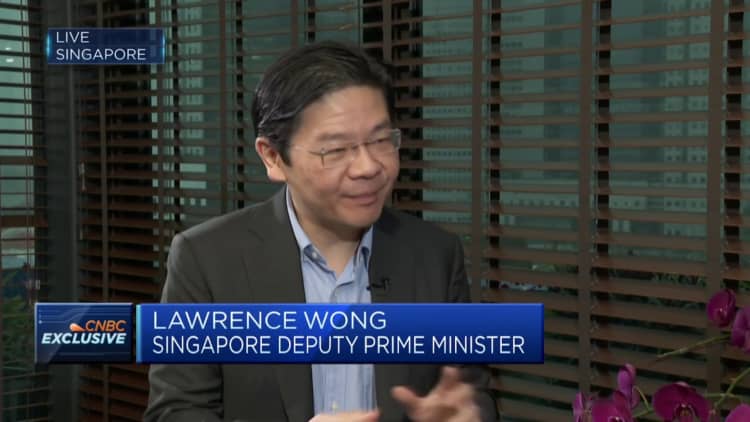Escalating conflict from the Russia-Ukraine war and the slowing global economy are some downside risks that Singapore must be prepared for, Deputy Prime Minister Lawrence Wong told CNBC in an exclusive interview Wednesday.
"We are a small country, we have to take the world as it is, and not what we would like it to be," said Wong who is also finance minister. "I think the game plan is really just to get back to basics, be very clear what our interests are, and advance those interests in a credible and principled manner consistently."
"There are a few [risks]," Wong told CNBC's Martin Soong. "The strength of the global economy, particularly the U.S. economy, that's one. I think most economists think that [the U.S. economy] will be okay this year. And even if there is a contraction, it will be relatively mild, but who knows? It can get worse."

He said the war in Ukraine could escalate and there could be more shocks to the global economy and global supply chains, as a result.
Covid-19 is another uncertainty, Wong said. "We think it's moved to a new phase but you never know."
Investors trust us, they have confidence in us, which is why even amidst these turbulence... we are continuing to see healthy flows of investments, capital and talent.Lawrence WongSingapore deputy prime minister
Singapore already has strong fundamentals and branding, and is "highly regarded for honesty, integrity with loyalty," Wong said.
"Investors trust us, they have confidence in us, which is why even amidst these turbulence ... around the world, we are continuing to see healthy flows of investments, capital and talent, and we should make full use of these opportunities," said Wong.
U.S.-China tensions
At the same time, Singapore will "continue to be friends with all countries, with the key superpowers, which we have very close relationships with, and our partners in ASEAN partners and the wider region."
On escalating tensions between the U.S. and China, Wong said Singapore "watched with great concern."
U.S. Secretary of State Antony Blinken postponed a planned trip to Beijing in February, after a suspected Chinese surveillance balloon flew over the United States. China says the balloon was a civilian weather airship meant for scientific research which went off-course.
"We hope that at some point in time, both sides can resume that engagement because it's so important for the two superpowers to have that ability to work together," Wong said. "If both sides move towards a second Cold War, the consequences will be huge."
The deputy prime minister said "it's not the same as the first Cold War given how much more integrated China is with the global economy. It will be devastating for all of us."
In the face of these challenges, Singapore hopes to be a "key node" in the global supply chain.
"I think the way the world is going, people and companies are talking about reshoring, onshoring, near-shoring," he told CNBC, referring to the relocation of factories and offices. Wong mentioned during his budget speech on Tuesday that businesses are reorganizing themselves to prepare for once-unimaginable tail risk, including geopolitical risk.
"Shifts are taking place. But however these shifts take place, there will be a supply chain. And we want to be a key node in that supply chain," he said.

